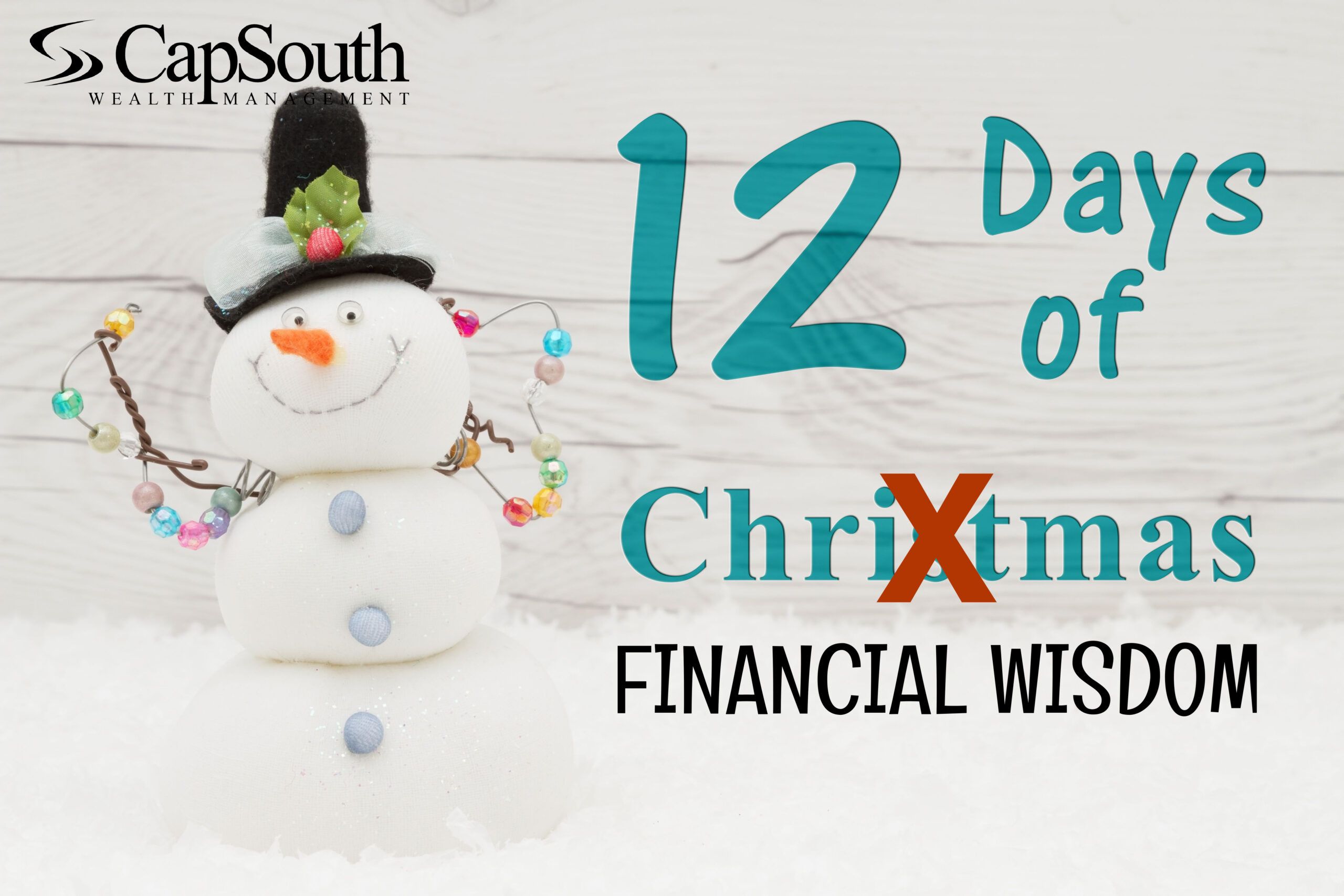The Twelve Days of Financial Wisdom: A Holiday Guide
The holiday season is in full swing. Throughout the years our family has grown to include new family members from different cultures and traditions. As we navigate a growing family and offer flexibility around busy holiday schedules, we want to embrace the joy and wonder this time of year without succumbing to the humbug feeling that can easily overtake us if we cling too tightly to old rhythms in this new life-phase. This year I find myself smack dab in the middle of a home remodel with no kitchen and zero furniture downstairs. In fact, I even found myself cooking dinner in our Master Bathroom the other night! It would be easy to focus on the inconveniences of a remodel, so we’ve chosen to stay positive and be thankful for all that we have been blessed with. Like the Grinch, I’m having my heart melt by connecting with people this season. An extra smile at the grocery store, a friendly wave and a thank you to the hard-working delivery people. I can see joy and wonder surrounding me this time of year if I just look around. I recognize this season isn’t the easiest or merry for many. It can be full of tough memories and lost loved ones. There is conflict all over the world reminding us that not everyone is safe and happy this year. Elvis knew what he was talking about when he sang about a blue Christmas. There especially seems to be a healthy tension this year for holding space for both hurt and hope. If you find yourself in a season where jolly and laughter elude you, then it is my sincere hope that my feeble attempt at some holiday humor brings a smile and a laugh. There’s a reason that I’m a Wealth Advisor and I’m not a stand-up comic, so let’s just keep that in mind too! Without further I do, I give you, “The Twelve Days of Financial Wisdom.” (P.S. If you can’t help but think of me singing this, let’s just pretend that I’ve got the voice of Mariah Carey belting out these great lines!)
Day 1: Diversify Your Assets Wisely
🎵 “On the first day of Christmas, my Wealth Advisor said to me: Diversify your assets wisely!” 🎵
Just like a well-balanced fruitcake, a diversified investment portfolio is a key ingredient for financial success. While fruitcakes might not be everyone’s favorite, diversification is almost universally adored by savvy investors. Spread your investments across various asset classes – stocks, bonds, real estate – with a goal of reducing risk and increasing potential returns.
Remember, just as a fruitcake brings together different flavors for a delicious outcome, diversification brings together different assets for a well-rounded and resilient investment strategy.
Day 2: Compound Interest, Oh What a Joy!
🎵 “On the second day of Christmas, my Wealth Advisor said to me: Compound interest, oh what a joy!” 🎵
Imagine compound interest as the holiday gift that keeps on giving. Much like a snowball rolling down a hill, your savings can accumulate and grow over time with the magic of compounding. The earlier you start, the larger the snowball – uh, I mean, your savings – becomes.
So, this holiday season, give yourself the gift of an early start on savings and watch your financial snowball grow into a winter wonderland of wealth.
Day 3: Budgeting Bells Are Ringing
🎵 “On the third day of Christmas, my Wealth Advisor said to me: Budgeting bells are ringing!” 🎵
While the holiday bells may be jingling, it’s essential to keep your budget from jangling out of tune. Create a realistic budget that includes your holiday spending, but don’t let it snowball into a financial avalanche. By tracking your expenses, you’ll avoid the post-holiday blues when the credit card bills start singing a less festive tune.
This season, let your budget be your guiding star, ensuring a harmonious and stress-free celebration.
Day 4: Hark! The Herald of Emergency Fund Angels
🎵 “On the fourth day of Christmas, my Wealth Advisor said to me: Hark! The herald of emergency fund angels!” 🎵
Life is full of surprises, and having a robust emergency fund is like having a team of financial angels ready to help when unexpected expenses arrive. Whether it’s a car repair or a sudden medical bill, your emergency fund can be a guardian angel, ensuring your financial stability in times of need.
This holiday season, let your emergency fund be your silent protector, allowing you to enjoy the festivities without worrying about unforeseen financial hiccups.
Day 5: Five Golden Retirement Rings
🎵 “On the fifth day of Christmas, my Wealth Advisor said to me: Five golden retirement rings!” 🎵
Retirement may seem like a distant future, but like the five golden rings in the classic song, it’s a valuable gift that requires careful planning. Help your retirement plans shine brightly by regularly contributing to your retirement accounts. The magic of compounding (Day 2, remember?) can work wonders over the long term, making your golden years truly golden.
This holiday season, make a resolution to invest in your retirement future and enjoy the sparkle of those golden rings in the years to come.
Day 6: Let Tax-Efficient Reindeer Lead the Sleigh
🎵 “On the sixth day of Christmas, my Wealth Advisor said to me: Let tax-efficient reindeer lead the sleigh!” 🎵
Just as Santa relies on his trusty reindeer to navigate the skies, you can rely on tax-efficient strategies to guide your financial sleigh. Take advantage of tax-deferred accounts, tax-free investments, and strategic tax planning to reduce your tax burden. It’s like leaving milk and cookies for the IRS – they get less, and you keep more.
This holiday season, let your financial sleigh be led by tax-efficient reindeer, ensuring a smooth ride toward your financial goals.
Day 7: The Magic of Giving – Charitable Contributions
🎵 “On the seventh day of Christmas, my Wealth Advisor said to me: The magic of giving – charitable contributions!” 🎵
This holiday season, let the spirit of giving extend beyond wrapped presents. Consider incorporating charitable contributions into your financial plan. Just as the warmth of a cozy fire spreads throughout the room, your generosity can create a positive ripple effect in your community and beyond.
Whether it’s supporting a local charity, contributing to a cause close to your heart, or volunteering your time, the act of giving not only makes a difference in the lives of others but also adds a meaningful dimension to your financial journey.
This holiday season, let the magic of giving be a guiding light, illuminating the path to a more compassionate and fulfilling financial future.
Day 8: Making a List, Checking It Twice – Financial Goals, That Is!
🎵 “On the eighth day of Christmas, my Wealth Advisor said to me: Making a list, checking it twice – financial goals, that is!” 🎵
Santa isn’t the only one who needs a list. Outline your financial goals clearly and revisit them regularly. Whether it’s saving for a dream vacation, a home, or your children’s education, having a well-defined list keeps you on track. Checking it twice? That’s reviewing and adjusting your goals as life evolves.
This holiday season, take a cue from Santa and keep your financial list in order – it’s a key to turning your dreams into reality.
Day 9: Wise Men (and Women) Seek Professional Advice
🎵 “On the ninth day of Christmas, my Wealth Advisor said to me: Wise men (and women) seek professional advice!” 🎵
Even the three wise men sought guidance when following the star. Similarly, seeking advice from financial professionals can provide you with the direction needed for a successful financial journey. Whether it’s investment strategies, tax planning, or retirement advice, a wealth advisor can be your guiding star.
This holiday season, be wise and seek the expertise of financial professionals to navigate the complex constellations of the financial world.
Day 10: The Gift of Education Keeps on Giving
🎵 “On the tenth day of Christmas, my Wealth Advisor said to me: The gift of education keeps on giving!” 🎵
Investing in education is a gift that lasts a lifetime. Whether for yourself, your children, or future generations, education is a powerful tool for personal and financial growth. Like the knowledge passed down through generations, the gift of education can open doors and create lasting legacies.
This holiday season, consider the gift of education as an investment in a brighter and more informed future.
Day 11: A Partridge in a Pear Tree – Invest in Your Home Nest
🎵 “On the eleventh day of Christmas, my Wealth Advisor said to me: A partridge in a pear tree – invest in your home nest!” 🎵
Just as the partridge nests in a pear tree for security, your home is your nest egg. Invest in your property wisely, keeping it well-maintained and considering home improvements that can enhance its value. Your home is not only a place of comfort but also a significant part of your financial portfolio.
This holiday season, let your home be a cozy and well-nurtured nest, providing both emotional and financial security.
Day 12: Drumroll, Please – The Beat of Financial Independence!
🎵 “On the twelfth day of Christmas, my Wealth Advisor said to me: Drumroll, please – the beat of financial independence!” 🎵
As we wrap up our Twelve Days of Financial Wisdom, let’s revel in the grand finale – financial independence. Just as the drumroll builds anticipation, the path to financial independence requires steady and disciplined beats. By saving diligently, making thoughtful investments, and planning for the future, you orchestrate the melody of financial success. Picture the day when you can confidently march to the rhythm of financial freedom, knowing your efforts have created a harmonious and secure future.
There you have it – “The Twelve Days of Financial Wisdom!” May the holiday season bring not only cheer and laughter, but also a renewed focus on your financial well-being.
As we close the chapter on this financial carol and wave goodbye to the year that’s making its exit, let’s hold on tight to the everlasting beat of relationship wisdom in our lives. Think of it like the cozy soundtrack of laughter we share with our favorite people, the easy flow of understanding that feels like a familiar tune, and the big, exciting moments we hit together – they’re all part of the warm symphony of our collective journey. Just like a family dinner where everyone’s got a seat at the table (that you hopefully didn’t prepare in your Master Bathroom), our connections make the kind of music that gives life its colorful rhythm. So, here’s to the echoes of good times, the easy chats, and the solid support that keep our shared story sounding just right.
Wishing you and your loved ones a wonderful holiday season filled with warmth, joy, and a financially sound future. Cheers to a prosperous New Year ahead!
To learn more about CapSouth Wealth Management, visit https://capsouthwm.com/what-we-do/
Article by: Jennifer Fensley, CFP®️,CRPS®️
CapSouth Partners, Inc, dba CapSouth Wealth Management, is an independent registered Investment Advisory firm. CapSouth does not offer tax, accounting or legal advice. Consult your tax or legal advisors for all issues that may have tax or legal consequences. This information has been prepared solely for informational purposes, is general in nature, and is not intended as specific advice. This article was produced with the assistance of ChatGPT (Version 3.5) in December 2023; Chat GPT is an artificial intelligence model owned by OpenAI. CapSouth is not affiliated with OpenAI.



